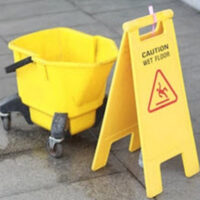Coefficient of Friction and Slip and Fall Accidents

People can slip and fall for many reasons. In typical fall cases, we just assume that there is a substance or material on the floor which causes someone to fall, and that is often the case. But that is not the only way people fall. Often, people fall simply because the floor where they are walking is slippery in its normal state, with no foreign objects or substances on it.
Friction Measurements
When someone falls on a surface something called the Coefficient of Friction (COF) becomes important. In plain terms, COF measures how slippery a surface is, and how much friction it generates. More friction is better, because more friction means better traction and thus a lower likelihood of slipping. A low COF means there is less friction, and thus, it is easier to fall.
Obviously, when there is a liquid substance on the floor, the COF lessens, because the floor can no longer generate the friction needed to keep your shoes firmly grounded. If you have ever hydroplaned your vehicle on pooled water on a roadway, you have experienced low COF. If you were to walk on a surface that was covered in pooled water, your shoes can also hydroplane (taking the rest of your body along for the ride).
Even surfaces with a very high COF can be dangerous. With too much friction, a floor can be so tacky and sticky that someone can stumble. A safe COF is a “sweet spot,” in between no friction and too much friction.
Shoes and Other Variables
The COF can be different depending on the victim’s shoes. The exact same substance can have high friction with one type of material on the soles of a pair of shoes, and a low friction with a different type of material. Leather bottomed shoes tend to have lower friction, and thus, be more likely to cause a fall.
Even the condition of your shoes can make a difference—rubber soled shoes which may tend to have high friction with most surfaces, can have low friction if the rubber is worn and old, or if the surface of the rubber is dirty.
This is why, if you do ever slip and fall, you should never throw out the shoes that you were wearing. Your personal injury attorney (and your experts) may need your shoes to measure the friction generated by the floor and your shoes.
Coefficient of Friction can even differ based on the victim’s height, weight, or any special walking styles, such as a gait or limp.
Experts Will be Needed
Of course an expert will usually be needed to test COF, and give opinions as to what COF is considered reasonable and safe, and what level of friction is considered dangerous.
The Tampa personal injury attorneys at Barbas, Nuñez, Sanders, Butler & Hovsepian can help you if you are injured in a slip and fall accident. Call us today to discuss obtaining damages after any accident. Schedule a consultation today.
Resource:
jurispro.com/files/documents/doc-1066205634-article-1733.pdf
https://www.barbaslaw.com/the-life-care-plan-expert-can-make-a-huge-difference-in-injury-cases/




